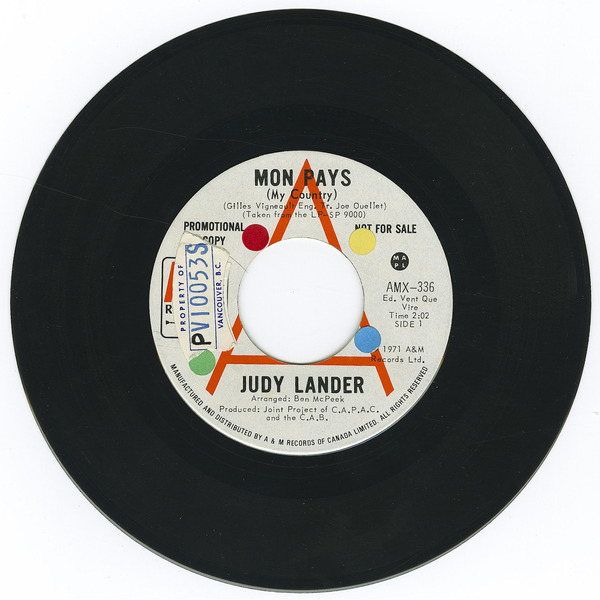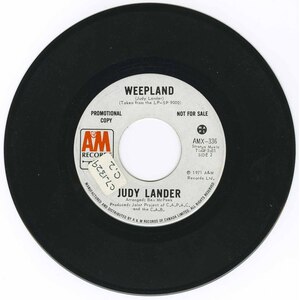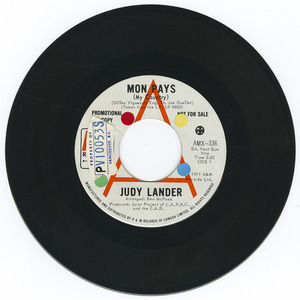Information/Write-up
i was born and raised on the prairies
and i began to sing around the age
of fifteen. i left the flatlands and
journeyed east to discover , something,
and now i’m older but younger,
i have felt the sad eyes
of old men
gazing
from the corners
of small town bars.
-judith, from the liner notes of Lady of Ginger (A&M SP-9000, 1970)
From Prairie Choir to Weill: The Journey of Judith Lander
by Robert Williston
Oct 19, 2025
Judith Lander grew up in Winnipeg, in a household steeped in art, education, and social purpose. Her mother, an early feminist and educator, was both the first Jewish and first female president of a major Canadian art gallery. With a doctorate in English, she taught hundreds of women art history through the 1940s and 1950s, urging them to leave their kitchens and claim a life of the mind. That intellectual, artistic atmosphere quietly shaped Lander’s own trajectory from prairie childhood to cosmopolitan performer.
As a child she was “kicked out of choirs,” told she had no voice. But while preparing for her bat mitzvah at thirteen, something remarkable happened: the act of learning to chant her prayers cracked open her throat. Out came what she later called her “foghorn voice”—rich, unexpected, unmistakably her own. The synagogue choir director, Sara Udow, recognized the gift immediately, invited her into the junior choir, and soon began teaching her privately. Within a year, Lander’s tone had blossomed into a full mezzo, and by her mid-teens she was winning top prizes at the Manitoba Music Festival. Around the same time, she began performing folk songs on CBC Winnipeg, her phrasing already marked by a natural sense of theatre. That blend of classical discipline and folk immediacy would define her art for decades to come.
At eighteen she left the prairies for Toronto to study Radio and Television Arts at Ryerson (now Toronto Metropolitan University). There she met Portia White, the legendary Black Canadian contralto whose power and grace transformed her life. Lander became one of White’s final protégées, studying technique and phrasing while absorbing her mentor’s deep spiritual conviction that song must come from lived experience. When White passed away in 1968, Lander composed a tribute titled “Lady of Ginger,” later recorded for her debut album. She appears at the close of the documentary Think on Me, which aired on Vision TV and possibly Bravo or CBC, performing that song as a luminous farewell to her teacher.
Her stage work first drew national attention in 1968, when she appeared in Jacques Brel Is Alive and Well and Living in Brussels at Toronto’s Bayview Playhouse Theatre—a production noted by RPM Weekly for its all-Canadian cast including Lander, Stan Porter, and Arlene Meadows.
By 1969 she was featured in Spring Thaw, Canada’s longest-running revue, where she performed Joni Mitchell’s “Michael from the Mountain” and Buffy Sainte-Marie’s “Now That the Buffalo’s Gone.” These choices reflected her growing alignment with contemporary Canadian songwriters—a direction she would later formalize on Lady of Ginger. That same year, she appeared at the John Drainie Awards performing a medley from Jacques Brel, sharing the stage with Doug Crosley and Dinah Christie in a Ben McPeek-directed tribute that celebrated Canadian theatre and television.
By then, Lander was already working on Lady of Ginger, produced by Ben McPeek for A&M Records of Canada. The project began as a CAPAC-sponsored experiment: an album of songs exclusively by Canadian writers. One day a small cardboard box arrived from CAPAC headquarters—filled with demo cassettes and reels by emerging Canadian songwriters. From that modest box came several discoveries. Murray McLauchlan arrived at McPeek’s studio with his guitar to sing “The Old Man” directly to Lander, the first time she’d heard it. She was immediately drawn to its quiet humanity and chose it for the album, helping launch McLauchlan’s early recording career. Around the same time, a friend told her about a young songwriter named Joe Hall living in a rented attic room. Lander climbed the stairs to hear him play, recognized his imagination instantly, and introduced him to McPeek—an encounter that led to Hall’s first professional recordings.
The search for material also led her to write two songs of her own, including the title piece “Lady of Ginger.” Another favorite—Milton Nascimento’s “Bridges,” newly translated into English—was recorded in studio with the great Doug Riley on organ. But the track was rejected when A&M insisted that every song on the album must be Canadian-written. “It was such a beautiful song,” she recalled. “Heartbreaking.” The same rule, ironically, excluded a work that perfectly suited the album’s spirit of internationalism.
Tension grew as McPeek added what she called “sugary strings” to the orchestral arrangements, contrary to his promise of restraint. Lander highly respected McPeek but rebelled, a reflection of her independent artistic instincts. She refused to approve the mix, fighting the project (before A&M was involved) for nearly a year until A&M’s Jerry Lecoursier granted her five hours of studio time to personally re-edit the song “Mon Pays.” It was a rare instance of a young Canadian woman asserting creative control in 1970’s male-run record industry. She later discovered that she had rewritten much of the English translation herself but was left uncredited, losing any royalties as the song gained radio play. For decades she refused to perform it; only in recent years has she reclaimed it, finally able to sing it again with pride.
Upon its release, RPM Weekly noted the album’s national distribution through A&M Canada and praised Lander for blending folk and pop originals arranged by Ben McPeek—a recording that stood apart for its Canadian repertoire and quiet artistry. In 1971, A&M planned a reissue of the LP following renewed airplay, signaling that Lady of Ginger had become a lasting fixture of Canada’s singer-songwriter era.
A French-language companion LP, Le tour de la terre by Montréal chanteuse Renée Claude (Barclay, 1969), mirrored much of Lady of Ginger’s repertoire, even including a French version of the title song. The two albums formed a rare English-French crossover project at the dawn of Canadian bilingual pop. Lander’s interpretation—refined, quietly dramatic, half art song and half pop poetry—placed her squarely at the intersection of the new singer-songwriter movement and Canada’s classical traditions. The title track, dedicated to Portia White, remains her signature work.
Following the album, Lander appeared in the 1973 documentary The Jews of Winnipeg (directed by Bill Davies and narrated by David Steinberg) while appearing in one of many successful productions of Jacques Brel Is Alive and Well and Living in Paris in Boston. Her emotionally charged performances drew raves, and she went on to star and record in Berlin to Broadway with Kurt Weill (Theatre de Lys, New York, 1972). Her rendition of “Surabaya Johnny” from that production—recorded on the original cast album—became a career landmark.
By the mid-1970s Lander shifted toward composition and dance-theatre collaboration. Partnering with choreographer Lynn Taylor-Corbett (then a young Alvin Ailey alumna), she created Diary, an autobiographical ballet based on four of her songs. Lander performed live at the piano while two dancers embodied her music—a radical format for the era. The piece became an underground sensation, later taken up by companies such as the Joffrey Ballet, American Ballet 2, Hubbard Street Dance Company of Chicago, and Les Ballets Jazz. Touring across North America and Europe, she developed a parallel career as composer-performer for contemporary dance.
Her next project, Spy in the House of Love, was based on Anaïs Nin’s novella. Lander met Nin personally in Boston and obtained the rights herself, creating an adaptation that toured internationally. She recalls Nin with reverence: “A legend—and she gave me permission to make her words sing.”
By 1980 Lander returned to Canada to star in the Toronto production of I’m Getting My Act Together and Taking It on the Road, a sold-out run that lasted two years. She later worked in New York with Stephen Schwartz on The Baker’s Wife before settling permanently in Toronto, balancing motherhood, composition, and performance.
In her fifties, Lander discovered a new calling as a vocal coach in Oakville and Toronto. Reluctant at first, she soon found teaching to be a natural extension of performance. Her philosophy was simple: to make her students whole through singing. She taught children, teens, and adults alike—privileged students, tribute artists, even patients recovering from lung transplants—through her deep-breathing and diaphragm techniques. Two of her most beloved teachers, both Black—Portia White in Canada and an American vocal master in Boston—inspired her lifelong commitment to breath, body, and emotional truth. “Every song,” she told her students, “must be lived, not merely sung.”
Her students have ranged from professionals to Beatles, Sinatra, ABBA, and Bee Gees tribute performers, drawn by her uncanny ability to unlock expression. Even after the pandemic curtailed her youth classes, she continued to teach privately and online, including First Nations teens from northern Canada and adult singers abroad. Her studio became less a place of instruction than of transformation.
In recent years, Lander has experienced a quiet renaissance. She revisited her theatre repertoire on From My Life (2015), praised for its intimacy and life-worn clarity. In the summer of 2025 she sang Brecht and Weill’s “Pirate Jenny” at the Royal Ontario Museum’s sold-out Holocaust exhibit closing, describing it as “the fascist song we still need to hear.” And in 2025 she was invited by award-winning documentary filmmaker Larry Weinstein—formerly of Rhombus Media, now dissolved—to lead a Kurt Weill workshop for graduating students at the Glenn Gould School, bringing her journey full circle from the stage of Berlin to Broadway to the classroom of a new generation.
Judith Lander’s story traces a singular path through Canada’s musical and theatrical history: from a Jewish girl in Winnipeg finding her voice at a bat mitzvah, to a young woman discovering McLauchlan and Joe Hall, to a performer championing Weill and Brel on Broadway stages, and finally to a teacher passing that hard-won artistry on to others. Her life, like her music, embodies a credo she learned from Portia White and carried through every performance: the song is not complete until it has been lived.
Judith is alive and well and living in Toronto at the Performance Arts Lodge (PAL), where she continues to teach and inspire new generations of singers.
-Robert Williston
Written by Judy Lander (Weepland); and Gilles Vigneault (“My Country [Mon Pays])
English translations: Judy Lander and Joe Ouellet (“Mon Pays”)
Arranged by Ben McPeek
Engineered by Henry J. Saskowski (A.E.S.)
Mixed by Phil Sheridan



No Comments